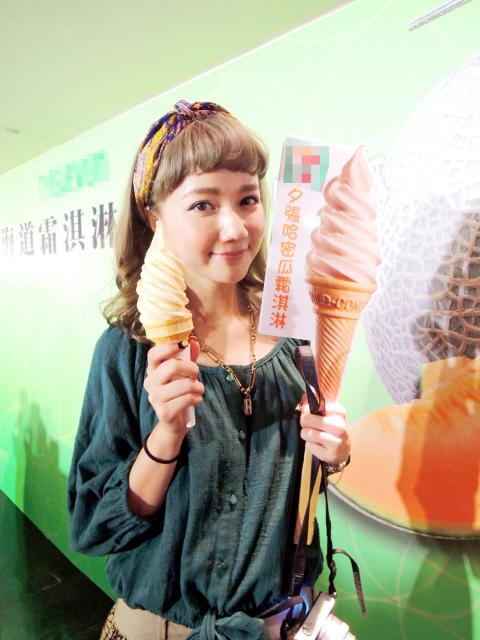In the latest salvo to be fired in Taiwan’s summer dessert war, 7-Eleven convenience stores announced on Tuesday that they are introducing “Hokkaido Yubari melon soft ice cream” to do battle with FamilyMart’s popular “mango soft ice cream.”
The soft ice cream, which is served in a crispy, edible cone or cup, has become a bestseller during the hot summer months in Taiwan.
Liang Wen-yuan (梁文源), head of Uni-President Enterprise Co’s fresh food division, said soft serve ice creams have become the 7-Eleven franchise chain’s No. 1 seller.

Photo: Yang Ya-min, Taipei Times
“Each store sells 200 to 300 ice creams on average per day. Some of our high-customer-density stores have sold more than 1,000 in a day,” he said.
With the arrival of sweltering summer days and students enjoying their holidays, 7-Eleven executives have decided to storm the market with the leading Japanese seller this year.
Hokkaido Yubari melon soft ice cream is made from milk and a prized variety of cantaloupe grown in Yubari, Hokkaido, known as the Yubari king melon — also known as one of the most expensive fruits on Earth.
“We held meetings and negotiated with our Japanese counterparts, and the outcome is that Hokkaido Yubari melon soft ice cream will be sold in Taiwan from July 13. The price will be NT$45 per ice cream,” Liang said.
He said the Japanese import is made from cantaloupes that have passed certification by the local agricultural association of Hokkaido’s Yubari region, to verify that the fruit are all 100 percent Yubari king melons.
“The milk used to make the ice cream originates in Hokkaido’s Tokachi region and is processed within 48 hours to become an ingredient for ice cream. Then it is frozen and transported by direct flight to Taiwan,” Liang said.
In the first week after July 13, the new flavor will only be available at 10 selected 7-Eleven stores in northern, central and southern Taiwan, but availability will be expanded in stages to 300 stores, the chain said.
“We expect to break new records for sales of soft serve ice cream in Taiwan,” a 7-Eleven spokesperson said. “Since the introduction of Hokkaido Tokachi milk soft ice cream in October last year, we have equipped 900 of our stores around the nation with soft serve ice cream machines. Up to now, we have sold more than 1.8 million ice creams at our stores.”
A FamilyMart official said that its mango soft ice cream has set an in-house sales record since its introduction last month. It surpassed the sales of strawberry soft ice cream that came on the market at about the time of Valentine’s Day.
“We will introduce two or three new flavors of soft ice cream by the end of the year. There is red-hot competition in the soft ice cream market in Taiwan, which is estimated to generate about NT$5 billion [US$167.3 million] in business annually. It is known as a ‘platinum’ market,” the official said.

ECHOVIRUS 11: The rate of enterovirus infections in northern Taiwan increased last week, with a four-year-old girl developing acute flaccid paralysis, the CDC said Two imported cases of chikungunya fever were reported last week, raising the total this year to 13 cases — the most for the same period in 18 years, the Centers for Disease Control (CDC) said yesterday. The two cases were a Taiwanese and a foreign national who both arrived from Indonesia, CDC Epidemic Intelligence Center Deputy Director Lee Chia-lin (李佳琳) said. The 13 cases reported this year are the most for the same period since chikungunya was added to the list of notifiable communicable diseases in October 2007, she said, adding that all the cases this year were imported, including 11 from

Prosecutors in New Taipei City yesterday indicted 31 individuals affiliated with the Chinese Nationalist Party (KMT) for allegedly forging thousands of signatures in recall campaigns targeting three Democratic Progressive Party (DPP) lawmakers. The indictments stem from investigations launched earlier this year after DPP lawmakers Su Chiao-hui (蘇巧慧) and Lee Kuen-cheng (李坤城) filed criminal complaints accusing campaign organizers of submitting false signatures in recall petitions against them. According to the New Taipei District Prosecutors Office, a total of 2,566 forged recall proposal forms in the initial proposer petition were found during the probe. Among those

The Mainland Affairs Council (MAC) today condemned the Chinese Communist Party (CCP) after the Czech officials confirmed that Chinese agents had surveilled Vice President Hsiao Bi-khim (蕭美琴) during her visit to Prague in March last year. Czech Military Intelligence director Petr Bartovsky yesterday said that Chinese operatives had attempted to create the conditions to carry out a demonstrative incident involving Hsiao, going as far as to plan a collision with her car. Hsiao was vice president-elect at the time. The MAC said that it has requested an explanation and demanded a public apology from Beijing. The CCP has repeatedly ignored the desires

The Ma-anshan Nuclear Power Plant’s license has expired and it cannot simply be restarted, the Executive Yuan said today, ahead of national debates on the nuclear power referendum. The No. 2 reactor at the Ma-anshan Nuclear Power Plant in Pingtung County was disconnected from the nation’s power grid and completely shut down on May 17, the day its license expired. The government would prioritize people’s safety and conduct necessary evaluations and checks if there is a need to extend the service life of the reactor, Executive Yuan spokeswoman Michelle Lee (李慧芝) told a news conference. Lee said that the referendum would read: “Do